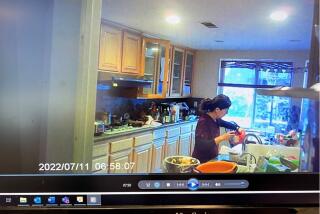Unsolved mystery of woman’s poisoning stokes passions in China
- Share via
BEIJING — She was a promising student at Beijing’s prestigious Tsinghua University, a talented musician who loved to swim and dreamed of studying German and computer science.
But in her sophomore year, Zhu Ling began suffering acute stomach pains and hair loss, eventually becoming severely disabled. Lab tests showed she had been poisoned with thallium, a toxic metal used in rat poisons, but police made no arrests and quietly closed the investigation.
Today, 19 years after Zhu first fell ill, she remains paralyzed, nearly blind and has the mental capacity of a child. And her case is suddenly generating a firestorm on Internet discussions in China and elsewhere, highlighting the Chinese public’s anger over perceived injustices, the powerful force of social media and the deep pains of a family that for two decades has sought answers from secretive authorities.
Zhu’s sad story has been publicized before, but a surge of sympathy expressed on the Internet started after the news last month of the poisoning death of a Shanghai university student.
In recent days, China’s Twitter-like service, Sina Weibo, and other microblogs have been flooded with posts demanding that the case be reopened. Many allege that Zhu’s roommate, now believed to be living in the United States, was behind her poisoning but that police dropped the matter because the roomate’s family was politically connected.
The activism has gone abroad as well, with more than 130,000 people having signed a petition on the White House website urging the U.S. to investigate and deport the suspect.
Chinese government censors, always mindful of anything that could trigger social unrest, deleted references to Zhu Ling on Weibo for a time, but the ban was lifted Monday as authorities apparently deemed the cyberspace protest manageable.
Then on Wednesday, Beijing police issued the government’s first public statement on Zhu, denying there was any outside interference and expressing regret that the crime couldn’t be solved because of a lack of direct evidence.
Zhu’s family lawyer, Li Chunguang, said in an interview Thursday that the statement only raised more questions. He said police told the family in 2007 that authorities received the case two months after Zhu was hospitalized, but the statement said it wasn’t until nearly six months later. If not direct evidence, what indirect findings did police have from the more than 130 people it said crime experts interviewed?
“The first priority is, if you can, find the [suspect], but if that couldn’t be done, at least you can show us the detailed investigation procedure,” he said, noting that it wasn’t until 2007 that Zhu’s family learned that police had closed its investigation in August 1998. Li said he was prepared to bring legal action against the government, however fruitless that might be. “We want to know the truth,” he said.
Zhu’s case was mysterious from the start. When she was hospitalized in late 1994, doctors couldn’t figure out what was wrong. It wasn’t until early the next year that Zhu’s friends, tapping what then was China’s very limited Internet connectivity, sent requests for help online to the medical world outside, according to accounts from Zhu’s classmates. Many doctors replied that the likely cause was thallium poisoning, but by then, Zhu’s condition had deteriorated.
Beijing’s public security bureau statement said that the diagnosis was made April 28, 1995, and that Tsinghua University reported it to police on May 5, after which a team of experts was immediately assigned.
In China’s blogosphere, many point to Zhu’s former roommate, Sun Wei, identified as Jasmine Sun in the the White House petition. (The White House declined to comment on the petition, except to say that it reviews all petitions that receive enough signatures; the threshold is 100,000.)
Sun was questioned by police, but they took no further action, according to the state-run China Daily.
But what accounts for the particular ire directed at Sun may be that she is the granddaughter of a powerful industrial leader, the late Sun Yueqi. Children of the elite are widely believed to enjoy special privileges.
The Times was unable to reach Sun’s family, including her father in Beijing, for comment.
The sympathy for Zhu is rooted in anger over injustice, said Zhao Jing, a closely followed blogger in Beijing who uses the pen name Michael Anti. In particular, he said, “it’s an echo from that kind of rage against the guan er dai,” a mocking reference to the “second generation” of officials, those who are descendants of powerful cadres in China.
Li, the Zhu family attorney, said Thursday that “police have a responsibility to give an answer on Sun Wei, whether she was a real suspect. I think it’s also for Sun Wei’s sake.”
Li, who said he started to represent the Zhu family on Tuesday, knows it will be difficult to make the investigation results public. But, he said, the Chinese legal system has been paying more attention to the rights of victims, in no small part because of activism on the Internet.
“The family has been helpless for so many years before the recent attention on Weibo,” said Li, who is from the southern Chinese city of Kunming. “And it all started with that [poison] murder case at Fudan university” in Shanghai. In that case, police quickly arrested the victim’s roommate.
Although China’s online vigilantism makes some people nervous, Zhan Jiang, a communications professor at Beijing Foreign Studies University, sees the attention to Zhu generated by social media as a healthy sign, even as such cases present some risks for the central government.
“If you continue to repress this, it won’t stop it,” he said of the short-lived blocking of discussion on Zhu. “This case will give an opportunity and be helpful for the rule of law to go one step forward,” he said.
For Zhu’s parents, who are in their 70s and spend their days and nights taking care of their daughter, there is little solace in all the Internet attention.
“She has always brought me happiness since she was little,” Zhu’s mother, Zhu Mingxin, said in an interview this week with China National Radio. “If everything went as we had planned for her, I’m sure she would be doing a great and I would be really happy for her. But now, all is lost.”
ALSO:
China closes down North Korean bank account
China dismisses U.S. accusations of cyber-spying
Obama, South Korean leader offer united front
don.lee@latimes.com
Tommy Yang and Nicole Liu in The Times’ Beijing bureau contributed to this report.
More to Read
Sign up for Essential California
The most important California stories and recommendations in your inbox every morning.
You may occasionally receive promotional content from the Los Angeles Times.











